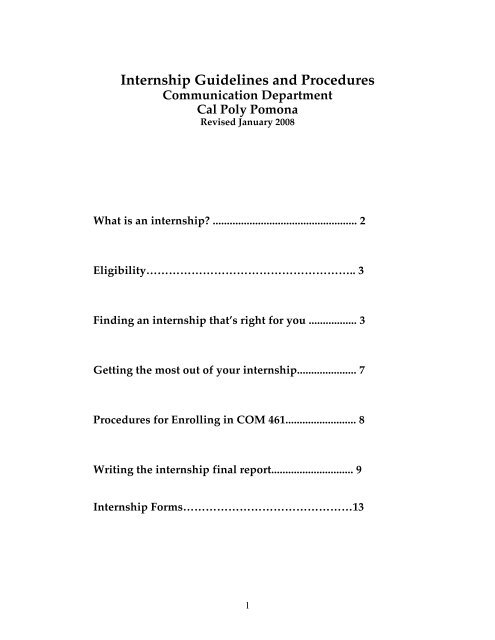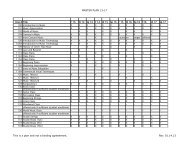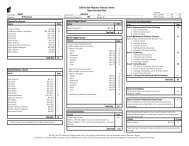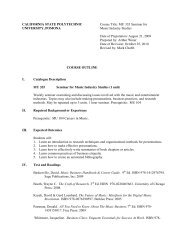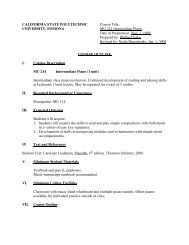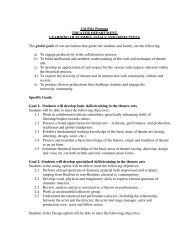Internship Guidelines and Procedures Manual - Cal Poly Pomona
Internship Guidelines and Procedures Manual - Cal Poly Pomona
Internship Guidelines and Procedures Manual - Cal Poly Pomona
You also want an ePaper? Increase the reach of your titles
YUMPU automatically turns print PDFs into web optimized ePapers that Google loves.
<strong>Internship</strong> <strong>Guidelines</strong> <strong>and</strong> <strong>Procedures</strong><br />
Communication Department<br />
<strong>Cal</strong> <strong>Poly</strong> <strong>Pomona</strong><br />
Revised January 2008<br />
What is an internship? ................................................... 2<br />
Eligibility……………………………………………….. 3<br />
Finding an internship that’s right for you ................. 3<br />
Getting the most out of your internship..................... 7<br />
<strong>Procedures</strong> for Enrolling in COM 461......................... 8<br />
Writing the internship final report............................. 9<br />
<strong>Internship</strong> Forms………………………………………13<br />
1
What is an internship?<br />
An internship is a cooperative learning arrangement between a private or<br />
governmental institution <strong>and</strong> the Communication Department that allows<br />
Communication students to apply their knowledge <strong>and</strong> skills in a professional<br />
setting. The internship program is a natural extension of <strong>Cal</strong> <strong>Poly</strong>’s “learning by<br />
doing” educational philosophy.<br />
The Communication Department is most concerned that the internship be a<br />
mentoring experience. In other words, the intern’s immediate supervisor should have<br />
significantly greater experience <strong>and</strong> expertise than the intern in the specific job<br />
functions performed by the intern, <strong>and</strong> the immediate supervisor should be willing<br />
<strong>and</strong> capable of teaching <strong>and</strong> coaching the intern.<br />
STUDENT BENEFITS<br />
Here are some of the benefits that will accrue for you:<br />
Gain on-the-job work experience.<br />
Learn important job skills.<br />
Self-assess your knowledge & skills <strong>and</strong> where you need to improve.<br />
Make professional contacts in the field.<br />
Develop professional portfolio materials.<br />
By interning with an institution in your field of specialization, you will have an<br />
opportunity to work with professionals, apply classroom knowledge to workaday<br />
problem situations, <strong>and</strong> learn first-h<strong>and</strong> about the dem<strong>and</strong>s <strong>and</strong> rewards of work in<br />
the particular profession. <strong>Internship</strong>s also give you a chance to network with people<br />
in the industry, so that you become a recognized name <strong>and</strong> face. Sometimes<br />
internships turn into full-time jobs for students after graduation. But you shouldn’t<br />
count on an internship becoming your first career position. Simply approach it as an<br />
opportunity to observe professionals at work <strong>and</strong> further develop your skills.<br />
SPONSOR’S BENEFITS<br />
Students receive training in their area of specialization.<br />
Students sometimes bring fresh approaches, new ideas.<br />
Educational contacts for recruiting new employees.<br />
Communication students have served as interns with daily <strong>and</strong> weekly newspapers,<br />
magazines, public relations agencies, corporations, educational institutions,<br />
hospitals, advertising agencies, <strong>and</strong> not-for-profit organizations. Some students have<br />
served internships on campus at <strong>Cal</strong> <strong>Poly</strong>. Here are some employers that have<br />
sponsored communication interns within the last few years:<br />
2
KABC-TV, KNBC-TV, KTLA-TV, ESPN, CNN, San Gabriel Valley Tribune,<br />
O. C. Register, Inl<strong>and</strong> Valley Daily Bulletin, American Cancer Society, Ketchum<br />
Communication, MTV, Bank of America, <strong>Cal</strong> <strong>Poly</strong> Public Affairs, Sacks/Fuller<br />
Advertising, Westin Hotels, Disney, Paramount, Cable Vision, Intervalley Health<br />
Plan, KBIG Radio, Sony, Warner Bros., Telemundo 52, Los Angeles Kings, LAX, Los<br />
Angeles Mayor’s Office.<br />
You will receive six units of academic credit for serving as an intern through<br />
enrollment in COM 461. The following sections provide detailed information about<br />
procedures <strong>and</strong> policies.<br />
Eligibility<br />
You must satisfy these criteria before applying for enrollment in COM 461:<br />
COM MAJORS ONLY<br />
You must be enrolled in the communication bachelor of science program to enroll in<br />
COM 461.<br />
SENIORS ONLY<br />
You must complete 135 credit units toward a bachelor’s degree before you are<br />
eligible to enroll.<br />
COURSE COMPLETION<br />
You must have completed two-thirds of your communication courses <strong>and</strong> specific<br />
courses within your option area before applying for an internship.<br />
MINIMUM 2.0 IN MAJOR<br />
You must have a 2.0 GPA in your communication classes to be eligible for an<br />
internship.<br />
Please note that although COM 461 is listed in the quarterly Class Schedule, the<br />
registration code number has been “suppressed.” You will be added to a student<br />
specific registration list by the Communication Department staff only after you have<br />
satisfied the eligibility requirements.<br />
Finding an internship that’s right for you<br />
It makes good sense to secure an internship that is closely related to the type of work<br />
you think you will prefer after graduation. Experiencing a particular type of<br />
professional work through an internship is a practical way of determining if it is<br />
really what you want to do after graduation. Remember also that previous work<br />
experience is important to employers, so if you decide to seek employment in the<br />
field after graduation you will already have relevant work experience reflected in<br />
3
your resume. Here are some factors to consider in finding an internship that is right<br />
for you:<br />
STAY WITHIN THE DISCIPLINE<br />
Your internship must involve practical application of communication skills as the<br />
primary activity. Legitimate situations include application of skills <strong>and</strong> knowledge<br />
you have learned in communication courses, such as communication theory,<br />
organizational communication, intercultural communication, public speaking,<br />
desktop publishing, public relations, <strong>and</strong> reporting. Only internships that are<br />
centrally focused on communication activities or services will be approved. For<br />
instance, a proposed internship in which a student will receive training as a retail<br />
sales representative falls outside these parameters <strong>and</strong> would not be approved.<br />
The Communication Department looks upon the internship as a mentoring<br />
experience. In other words, (1) your immediate supervisor should have<br />
significantly greater experience <strong>and</strong> expertise than you do relative to the job<br />
functions you will be asked to perform, <strong>and</strong> (2) your immediate supervisor should<br />
be willing <strong>and</strong> capable of teaching <strong>and</strong> coaching you.<br />
SPONSOR’S HISTORY WITH INTERNS<br />
Has the particular sponsor had an ongoing internship program or will this be its first<br />
experience with an intern? If the institution has accepted interns in the past, its<br />
supervisors probably have a better underst<strong>and</strong>ing of how to utilize an intern – to the<br />
mutual satisfaction of everyone –– than do supervisors of an organization that<br />
accepts you as its first intern. If it is the community affairs department of KNBC<br />
you’re interviewing with, they’ve been there <strong>and</strong> done that a hundred times. But if it<br />
is “Spaced-Out TechnoCom, Inc.,” a new seven-person website designer, you have<br />
less assurance of internship continuity. So always ask about the sponsor’s experience<br />
with internships.<br />
TO PAY OR NOT TO PAY<br />
Most internship sponsors do not, but it never hurts to ask. Frequently, the<br />
institutional response will be “your experience is your reward” or some similar<br />
platitude. Just keep in mind that interning for fun (gaining experience) <strong>and</strong> profit<br />
(being paid, too) is the way to go. Some organizations offer no wages but will<br />
provide travel expenses for interns who commute. Once again, ask the question <strong>and</strong><br />
do not be hesitant about letting them know your skills are valuable. If they want to<br />
know what the going rate is for interns, tell them $9 to $12 an hour, as advised by the<br />
COM Department.<br />
4
UNIONIZED OR OPEN SHOP?<br />
Whether a particular organization is unionized or not can have a significant bearing<br />
on the type of work you would be permitted to do as an intern. If the internship<br />
sponsor is unionized, you probably will not be doing any technical<br />
h<strong>and</strong>s-on work, because the union contract prohibits non-members from operating<br />
equipment. So if you want h<strong>and</strong>s-on experience operating a studio camera, do not<br />
apply at KNBC; instead, consider some non-unionized institutions –– ITAC at <strong>Cal</strong><br />
<strong>Poly</strong>, municipal cable-access, or various other corporations.<br />
PROJECT PARTICIPATION<br />
Ask if you will be permitted to take part in a project. Examples include creating a<br />
new employee newsletter, designing <strong>and</strong> executing an audience-response survey,<br />
designing multimedia materials for an annual report, planning /executing a special<br />
event for a new product launch, creating a press kit, or putting out a feature section<br />
in a publication. If the answer is no, then the likelihood is high that your internship<br />
duties will include much routine “grunt work.” Try to avoid this type of internship.<br />
If you secure an internship that allows you to work on specific projects –– ideally<br />
from start to finish –– then you will walk away from the internship with some<br />
tangible work products that you can add to your professional portfolio.<br />
Subsequently, when you interview for that first career position, you’ll have<br />
meaningful experiences to discuss with your interviewers. Keep in mind that the<br />
most frequent complaint the Communication Department gets from interns is that<br />
they were not allowed to work on any sort of project. Insist that you be allowed to<br />
work on a project; if they say no, keep looking.<br />
WHERE TO LOOK<br />
You might want to start with the Communication Department, which maintains an<br />
internship bulletin board in Building 1, Room 313. The bulletin board carries current<br />
fliers <strong>and</strong> internship announcements from local, regional, <strong>and</strong> national organizations.<br />
Professional organizations such as the L. A. chapter of the Public Relations Society of<br />
America <strong>and</strong> the <strong>Cal</strong>ifornia Newspaper Publishers Association occasionally send<br />
internship directories to the Department that you may consult. Additionally, the<br />
Communication Department has a list of internships recently completed by <strong>Cal</strong> <strong>Poly</strong><br />
Communication students. In some cases, a final internship report may be available<br />
for your reference. See Lyn Hughes, in 1-313, or Dr. Richard Kallan, the internship<br />
coordinator, in 1-310, to use the directories. You can also track down internship<br />
opportunities using the following Internet websites:<br />
Public relations<br />
www.prsala.org/ (Public Relations Society of America)<br />
www. monstertrak.com<br />
Search net for “public relations internships.”<br />
5
Journalism (print <strong>and</strong> broadcast)<br />
www.internshipprograms.com<br />
monstertrak.com<br />
Search net for “journalism internships.”<br />
Miscellaneous<br />
www.csupomona.edu/career/students.html<br />
This site is maintained by the <strong>Cal</strong> <strong>Poly</strong> <strong>Pomona</strong> Career Center. It<br />
has a sub category, Job Trak, that puts you in touch with many<br />
companies on-line. Though internships might not be listed<br />
specifically, the company may offer them. You would need to<br />
inquire.<br />
LEARNING OBJECTIVES<br />
In terms of professional development, determine what it is that you want out of an<br />
internship; those outcomes are your learning objectives. Here are some examples<br />
that were specified by other COM students.<br />
Creative problem solving. “I look forward to sharing my ideas <strong>and</strong> adding my<br />
insights in naming new products, merch<strong>and</strong>ising, <strong>and</strong> designing. I hope the<br />
company will be very open to new ideas.”<br />
Managerial skills development. “I know ‘intern’ = ‘gofer’ = ‘low man on the totem<br />
pole.’ On the other h<strong>and</strong>, my goal is to have the opportunity to manage some<br />
projects. If I can manage those tasks effectively, I’ll prove I can h<strong>and</strong>le more<br />
significant challenges.”<br />
Technical skills development. “From general office skills to more technical skills ––<br />
drafting press releases, media pitches, planning special events, conceptualizing<br />
publicity campaigns –– these are the tasks that will benefit me.”<br />
Acquiring industry knowledge. “While I have read <strong>and</strong> studied PR in great detail, I<br />
have no firsth<strong>and</strong> knowledge of the industry. I hope that my stint as an intern will<br />
provide tangible experiences in launching a new product, pitching stories to media,<br />
<strong>and</strong> ‘putting out fires.’”<br />
PREPARING FOR INTERNSHIP INTERVIEWS<br />
Most organizations will require that you interview with them as part of the<br />
application procedure. Interviews can range in formality from short, informal yougot-the-job<br />
affairs to formal 30-minute sessions conducted along traditional lines of<br />
6
questioning, the latter situation usually occurring in highly competitive internship<br />
situations.<br />
Prepare for your internship interview the same way you would prepare for an entrylevel<br />
position in the particular field. Make certain you have a resume <strong>and</strong>, perhaps, a<br />
portfolio. A sample resume is included at the end of these guidelines, which you can<br />
use as a model if you have not already created a resume. Be certain to list <strong>Cal</strong> <strong>Poly</strong><br />
classes that are pertinent to the particular type of internship you seek. You might<br />
also have been involved in enough “h<strong>and</strong>s-on” activity to assemble a professional<br />
portfolio, which is a sample collection of your best work. (Journalists usually call<br />
them “stringbooks.”)<br />
Before you go to the interview, make a list of questions you want to ask. Although<br />
the interviewer will ask most of the questions, you will have an opportunity to get<br />
some answers yourself. Find out about specific job responsibilities, compensation,<br />
project participation, work schedules, <strong>and</strong> varied professional development<br />
opportunities.<br />
Dress appropriately for the interview <strong>and</strong> conduct yourself in a professional manner.<br />
Keep in mind that internships sometimes turn into full-time job opportunities, but<br />
only for interns who perform in an exemplary way –– from day one. If you feel you<br />
need some coaching on how to interview effectively, call the <strong>Cal</strong> <strong>Poly</strong> <strong>Pomona</strong> Career<br />
Center, 869-2344, for an appointment or stop by the center in Building 97, Room 100.<br />
Counselor Sharon Mathis-Curd works closely with COM students. The Center<br />
provides help with resumes, portfolios, <strong>and</strong> letters of application. It also offers mock<br />
job interview sessions. In the Communication Department, Dr. Kallan can help you<br />
refine your resume.<br />
Getting the most out of your internship<br />
AVOID GETTING LOST IN THE SHUFFLE<br />
Once you have started an internship, you might find you’re not receiving as much<br />
supervision as you had expected. Work place pressures <strong>and</strong> unanticipated crises<br />
sometimes create distractions for supervisors. As a result, they might pay less<br />
attention to your professional development than they originally promised. If you<br />
run into that sort of situation, politely remind them of the promise that was made to<br />
you respecting your duties <strong>and</strong> involvement in the business. Remember, your time is<br />
valuable, too, <strong>and</strong> you’re there to learn. Don’t be hesitant about asking your boss to<br />
include you more directly in day-to-day operations.<br />
DOCUMENT YOUR ACTIVITIES<br />
Your final report writing task will be more manageable if you keep a journal of your<br />
daily activities during the internship. Sometimes internships stretch across an entire<br />
year. Trying to recount from memory precisely what you did <strong>and</strong> when you did it<br />
<strong>and</strong> to what effect can be frustrating as well as inconclusive. Take time each week to<br />
write down some notes about your internship activities. You need not record every<br />
activity on a day-to-day basis. Instead, simply make a note of significant<br />
7
developments <strong>and</strong> activities in which you were involved. Also, be sure to read the<br />
Writing the Final Report section in this booklet before your start the internship. It<br />
offers further guidance on the sort of information you will need for the final report.<br />
Additionally, be sure to collect in a timely manner the documents you will need for<br />
the report appendix. Make copies of all news stories, press releases, speeches,<br />
scripts, newsletters, <strong>and</strong> other messages that you prepared. If a particular message<br />
goes through several stages of production, try to include copies of the original form<br />
<strong>and</strong> the finished form. These materials will be returned to you after your report has<br />
been evaluated.<br />
MEET PEOPLE!<br />
“It’s who you know not what you know.” If you have never worked in the industry<br />
before, an internship is a great opportunity for you to become a visible player, or at<br />
least potential player, in the field. Suddenly, you are more than just an abstraction<br />
on a resume; you have a name, face, <strong>and</strong> personality. During an internship, you have<br />
an opportunity to rub shoulders with professionals in your field. Do the networking<br />
thing, definitely!<br />
WALK THE WALK, TALK THE TALK<br />
Observe <strong>and</strong> listen. Professional organizations have their own particular methods of<br />
operation <strong>and</strong> their own particular way of incorporating technical phrasing <strong>and</strong> use<br />
of jargon into their work discussion. For many students, knowledge of a particular<br />
professional field has been gained mostly through an academic perspective. An<br />
internship presents you with an opportunity to gain insight through an operational<br />
perspective, working with people who are more pragmatic than theoretical in their<br />
outlook. So keep your senses keen <strong>and</strong> let the learning curve take off.<br />
Procedure for enrolling in COM 461<br />
1. Complete the <strong>Internship</strong> Questionnaire <strong>and</strong> return it to the Communication<br />
Department, which will notify you about your eligibility. Remember, you must be a<br />
senior who has completed the courses listed on the eligibility form by the time you begin the<br />
internship.<br />
2. If your eligibility is verified, you will receive an internship contract form from the<br />
Communication Department. Subsequently, you may proceed with the process<br />
outlined in the previous section of these guidelines. Once you have interviewed with<br />
an internship sponsor, contact Lyn Hughes, 1-313, ext. 3522, to set an appointment<br />
with Dr. Kallan, who will discuss the proposed internship <strong>and</strong> your related duties.<br />
Bring the completed contract form with you, making sure that you have indicated<br />
what your learning objectives are for the internship. At the conclusion of this<br />
meeting, you will either receive permission to proceed with the internship or you<br />
will be required to reconsider your proposal. Return the approved contract to Lyn.<br />
8
Ideally, you should do this one academic quarter before you intend to begin the<br />
internship.<br />
3. Once your internship has been approved by Dr. Kallan, the Communication<br />
Department will notify your internship sponsor <strong>and</strong> communicate its expectations<br />
for your internship. Additionally, the Department will request a written statement<br />
on institutional letterhead stationery from your sponsor that describes the duties you<br />
will perform during your internship. (Two hundred hours of internship work are<br />
required to receive six units of academic credit.) This letter may be mailed to the<br />
Communication Department by your sponsor or you may deliver it yourself.<br />
4. If you wish, you may use up to three internships to accumulate the 200 hours of<br />
on-the job training required by your internship. However, if you use more than one<br />
internship to fulfill requirements you must repeat steps 2 <strong>and</strong> 3 above for each<br />
additional internship.<br />
5. You are not required to meet regularly with the Dr. Kallan once the internship has<br />
been approved; however, you may consult with him whenever you feel the need.<br />
6. Upon completion of the internship <strong>and</strong> before you finish writing your final report,<br />
you should notify the Communication Department that you have completed your<br />
internship field work. The Department will then mail a questionnaire to your<br />
supervisor, asking him/her to rate your performance <strong>and</strong> verify the total number of<br />
hours you worked. You also will be given a questionnaire to complete about your<br />
job performance.<br />
7. You have one year to complete your internship requirements. For instance, if you<br />
enrolled in COM 461 in Spring Quarter you have until the end of Spring Quarter one<br />
year later to complete all requirements. You will receive an Incomplete grade until<br />
you have fulfilled all requirements. (If you cannot fulfill all requirements within one<br />
year, you should meet with the internship coordinator to discuss your situation.)<br />
8. You must submit your final report by the end of the 8th week of the quarter in<br />
which you wish to receive credit for COM 461. Whether you receive credit or no<br />
credit is determined by the internship coordinator after careful evaluation of your<br />
performance, as evidenced in your written work, your portfolio, <strong>and</strong> the supervisor’s<br />
evaluation. Graded reports will be retained by the Communication Department for<br />
only one quarter after submission. Please pick up your graded internship report by<br />
that time.<br />
PURPOSE<br />
Writing the internship final report<br />
As a culminating COM 461 assignment, student interns write a final report. The<br />
purpose is threefold: First, the report demonstrates to Communication faculty that<br />
you can accurately describe <strong>and</strong> objectively evaluate a work situation from a<br />
professional's point of view. Second, it forces you to think about the internship<br />
experience in terms of your learning objectives, which are reflected in the skills <strong>and</strong><br />
knowledge you acquired. Third, it provides documentation that the Department will<br />
9
use to make future decisions about placing student interns with the particular<br />
institution.<br />
Submit your report in hard copy <strong>and</strong> on a CD. This CD will not be returned to you; it<br />
will be filed in the Communication Department office so that your report can be<br />
referenced by other students in the future. You need not include supporting<br />
materials from the appendix on the disk. The printed version of the report <strong>and</strong> the<br />
appendix will be returned to you after the report has been evaluated.<br />
INTERNSHIP REPORT CONTENT<br />
Your report should include information about each of the areas below. Use these<br />
headings in your report <strong>and</strong> follow this order of presentation. The report will be<br />
twelve to fifteen pages in length. <strong>Guidelines</strong> for section length are in parentheses.<br />
Format instructions follow this section.<br />
Establishing the <strong>Internship</strong>. Describe how you secured the internship. How did you<br />
get the idea, who did you talk with? Did you encounter any problems? Why did<br />
you think this situation was right for you? Was this a paid internship? (one or two<br />
paragraphs)<br />
Learning Objectives. Specifically, what did you intend to learn during this internship<br />
that would make you better prepared to reach your career goals? Relate this aspect<br />
to technical skills, managerial skills, creative problem-solving, industry knowledge,<br />
or other learning outcomes. (about a page)<br />
Sponsoring organization. Describe the institution(s) at which you interned in terms<br />
of its business objectives, its position in the industry or, if part of the public sector, its<br />
role in governmental service. Specifically, what is its stock in trade –– what products<br />
or services does it offer? Who are its customers? How many employees work there?<br />
How is it structured in terms of divisions <strong>and</strong> departments? What is its annual<br />
operating budget? Who are its principal competitors? (a paragraph or two)<br />
Departmental responsibilities <strong>and</strong> objectives. Specifically, to which department in<br />
the organization were you assigned? Where any <strong>Cal</strong> <strong>Poly</strong> alumni working in it? If<br />
so, please note their full names <strong>and</strong> positions they hold. What is the department's<br />
function in relation to the institution as a whole? Management structure? Number<br />
of employees? Objectives? Problems that interfere with reaching objectives? (a<br />
paragraph or two)<br />
My responsibilities <strong>and</strong> duties. Describe the assignments you were given. Please do<br />
not chronicle your day-to-day activities; simply relate your major work activities during<br />
the internship, indicating the approximate number of hours spent on them. How did<br />
they relate to the department's objectives? Try to categorize these, if appropriate,<br />
into either program-related activities or routine-operational activities. Programrelated<br />
activities are those that directly supported some timely objective of your<br />
department. They are usually associated with some culminating work product, <strong>and</strong><br />
represent the fun stuff in an internship. Routine-operational activities, on the other<br />
h<strong>and</strong>, are the "gofer" activities assigned to you that deal with seemingly mundane<br />
aspects of the business. For better or worse, all internships involve a certain amount<br />
10
of work in the routine-operational category. Think of it as a head start on "paying<br />
your dues." (one to two pages)<br />
Applying my skills <strong>and</strong> knowledge. Note the particular skills you used during the<br />
internship. These will no doubt include personal skills –– your ability to present a<br />
persuasive argument, for instance –– as well as technical skills, such as using desktop<br />
publishing software to design materials. Additionally, note how your university<br />
education enabled you to underst<strong>and</strong> professional situations <strong>and</strong> facilitate problem<br />
solving. For instance, did you encounter any ethical problems during the internship<br />
that perhaps made you turn for guidance to some of the principles you studied at <strong>Cal</strong><br />
<strong>Poly</strong> in the communication law <strong>and</strong> ethics courses? In particular, tell us about classes<br />
at <strong>Cal</strong> <strong>Poly</strong> that were helpful in providing knowledge or skills useful to you on the<br />
job. Did you encounter situations where you felt disadvantaged on the job as a result<br />
of some weakness in your university preparation?<br />
In reference to work products, what contributions did you make? Be certain to<br />
include in the report appendix copies of any materials you prepared or helped<br />
prepare.<br />
Last, explain how compatible your actual internship situation was with the learning<br />
objectives that you originally established for yourself. Did you find that your<br />
original objectives needed revising to suit the reality of the actual on-the-job situation<br />
or were your expectations fully realized during the internship? This section of the<br />
final report is crucial. If you do not offer a comprehensive assessment, the report may be<br />
returned to you for further attention. You should devote at least four pages to this section of<br />
the final report.<br />
Evaluating the internship sponsor. This section requires you to make some critical<br />
judgments. In the future, students <strong>and</strong> faculty will refer to your commentary to help<br />
them decide if the internship situation you have described is suitable for someone<br />
else. Here are a few issues you will want to address:<br />
• In terms of supervision, were you told to report to a specific person? Was<br />
your supervisor readily accessible? (For instance, could you speak with the<br />
person once a week if need be?)<br />
• Did your supervisor have expert knowledge or skills that related to your job<br />
activities or were you the only "communication specialist" in the work unit?<br />
• Were you promised any internship training opportunities that were never<br />
realized? Did personnel at the internship site demonstrate on-going interest in<br />
your personal learning process?<br />
• Did you receive any feedback about your work performance? Did the<br />
internship sponsor encourage you to take the initiative in deciding how a<br />
particular task should be accomplished? (about a page)<br />
If I could change the world. After observing the operations of the sponsoring<br />
institution for several months, what suggestions do you have now for improvement<br />
in the way they organize for work? Would you encourage the Communication<br />
Department to pursue future internship opportunities with this sponsor? If you feel<br />
11
strongly that the internship should not be continued, you may wish to speak directly<br />
with the internship coordinator, Dr. Kallan, about your concerns. (one to two pages)<br />
<strong>Internship</strong> report format. You do not need a formal title page. Simply provide the<br />
following information at the top of the first page:<br />
Your name Organization name<br />
Student identification number Supervisor's name<br />
Date of the report Address <strong>and</strong> phone<br />
12<br />
Paid (rate) or unpaid<br />
Full-time work was/<br />
was not offered.<br />
Next, compose a resume entry following the example below. Start your report five<br />
lines below the resume entry.<br />
News Writing Intern<br />
Inl<strong>and</strong> Valley Daily Bulletin, Ontario, <strong>Cal</strong>ifornia<br />
January 2006 to June 2007<br />
• Assisted Sports Editor with high school basketball game coverage.<br />
• Edited wire service copy <strong>and</strong> wrote headlines.<br />
• Wrote feature story about <strong>Cal</strong>ifornia International Speedway.<br />
• Assisted photo editor with photo coverage of high school sports.<br />
Use st<strong>and</strong>ard page margins of at least one inch <strong>and</strong> double space between lines.<br />
Make certain your printer produces a dark image. Manuscripts that are lightly inked<br />
will be returned for reprinting.<br />
Place samples of your work <strong>and</strong> other supporting documentation in a three-ring<br />
binder marked Appendix. Include a table of contents for the appendix if you have<br />
several items.<br />
Don't forget to submit both a hard copy of your report <strong>and</strong> an electronic copy in<br />
Microsoft Word on a CD.
ELIGIBILITY FORMS<br />
Index of Sample <strong>Internship</strong> Forms<br />
PAGE 14 – JOURNALISM ELIGIBILITY FORM<br />
PAGE 15 – ORGANIZATIONAL COMMUNICATION ELIGIBILITY FORM<br />
PAGE 16 – PUBLIC RELATIONS ELIGIBILITY FORM<br />
INTERNSHIP CONTRACT FOR COMMUNICATION 461<br />
13


